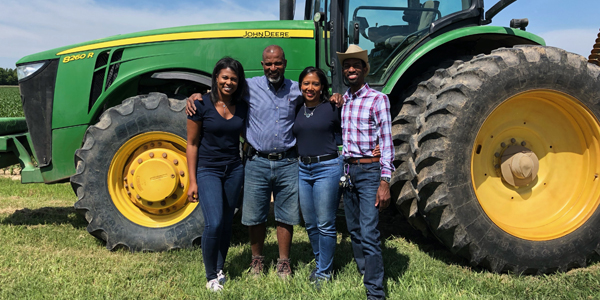
Ag-Vocating for Inclusive Agriculture
By Kate Tindall and Melea Reicks Licht
Ag-vocate (n.) — one who supports or promotes the interests of farmers, agricultural issues and the agriculture industry as a whole.
Dewayne Goldmon (’91 PhD agronomy) is one of the biggest ag-vocates out there. As executive director of the National Black Growers Council and an appointee to the U.S. Department of Agriculture’s Advisory Committee on Minority Farmers, he represents the needs and concerns of underrepresented populations, especially Black row-crop farmers.
His efforts earned him the ISU College of Agriculture and Life Sciences 2020 George Washington Carver Distinguished Service Award.
“National and world population demographics dictate that agriculture be more efficient and productive as farmers strive to produce sufficient food, feed, fuel and clothing,” Goldmon says. “This production must be done on farms that conserve natural resources in a sustainable fashion, for all farmers. Minority farmers, and especially Black farmers, have played a pivotal role in meeting these challenges.”
IGNITING AN ASSOCIATION
Goldmon inspired a paradigm shift for Black agriculturalists, says P.J. Haynie, Virginia farmer and chair of the Board of Directors for the National Black Growers Council. Goldmon’s work gathering feedback from Black farmers during his time at Monsanto inspired the creation of their 12-year-old organization.
“An invitation from Dewayne changed my life. By participating in Monsanto’s initial meeting to form a Black grower advisory council, I had my first opportunity to shake the hand of another Black farmer walking the same walk, and facing the same challenges — discrimination, racism,” says Haynie. “After that meeting, we continued to exchange thoughts and ideas. We realized we had something to offer for the greater good of agriculture. It was then we laid out the structure for the National Black Growers Council.”
Haynie says Goldmon is, “the catalyst and the real engine” of the organization.
“We want to make sure Black farmers have the same tools in their toolbox as their neighbors,” Haynie says. “We hold field days around the country — one on Dewayne’s farm every year — showcasing the latest technology and management practices.”
LIFTING UP VOICES
The USDA’s Advisory Committee on Minority Farmers was created in accordance with Section 5 of the Agricultural Credit Improvement Act of 1992. Its primary roles are to advise the U.S. Secretary of Agriculture on the implementation of outreach funds for minority farmers, as well as advising the USDA on ways to maximize these farmers’ participation in various USDA programs and implementing civil rights activities.
2020 marks Goldmon’s third consecutive term serving on this committee. He says diversity and inclusion are important in all areas, and certainly in agriculture.
“The goal of having all producers — regardless of race, operation size, products produced or location — operate at peak productivity and efficiency is a requirement for human sustainability. Diet preferences are changing, and consumers increasingly demand more information on the origin, safety and quality of their food. Maintaining a rich source of diverse producers is critical to meet these demands and maintain confidence in our agricultural system.”
DEEP ROOTS
The story of Goldmon’s interest in agriculture, and dedication to creating a better, more inclusive environment in the national agricultural community, has deep roots. Goldmon grew up on a small farm in southeast Arkansas where he — along with his parents and 10 brothers and sisters — took part in the production of cotton, soybeans and fresh market vegetables. By the time he reached high school, Goldmon’s curiosity had blossomed to a keen interest in agricultural science.
He graduated from the University of Arkansas with his bachelor’s degree and then spent a summer as a county agent intern. It was during this time that Goldmon realized the value of an advanced degree — a decision that would lead him first to attain his master’s degree and then head to Iowa State to earn his doctorate. At Iowa State he studied under professor Keith Whigham (’66 agronomy, ’69 MS, ’71 PhD), and his research focused on the genetic and environmental factors of intercropping soybeans into winter wheat. Goldmon also worked with the minority programs office in the College of Agriculture and Life Sciences and was one of the founding members of the ISU chapter of Minorities in Agriculture, Natural Resources, and Related Sciences (MANRRS).
“My experiences at Iowa State honed my skills as an agronomist, but also made me more comfortable advocating for and securing resources to address the needs of underrepresented students in agriculture,” Goldmon says. “In my professional career, these skills remained useful as I spent considerable time trying to do the same for minority farmers across the country.”
Goldmon went on to build a 25-year career with Bayer Crop Sciences in technology and product development, government affairs and outreach while farming “part time.” He retired as Outreach Lead in December 2019 before taking on his role with the National Black Growers Council earlier this year.
His family has many Cyclones, including his brother, Moses (’87 MS health physical education and recreation), wife, Debra (’90 MS hotel restaurant and institutional management), and son, Dewayne II (’18 landscape architecture).
Sticking to the passion that started his journey to ag-vocate, Goldmon finds time each year to do tilling, planting and harvesting on his own Dell-Cam Farm, Inc. They were named the Southeast District and Jefferson County Farm Family of the Year in 2019 by the Arkansas Farm Bureau.
“I currently grow corn, rice and soybeans on 1,400 acres in southeast Arkansas,” he says. “The 2020 season was my 23rd crop.” Goldmon continues working to improve the efficiency, productivity and sustainability of Black row-crop farmers and lifting up the voices of minority farmers in his work with the U.S. Department of Agriculture.



